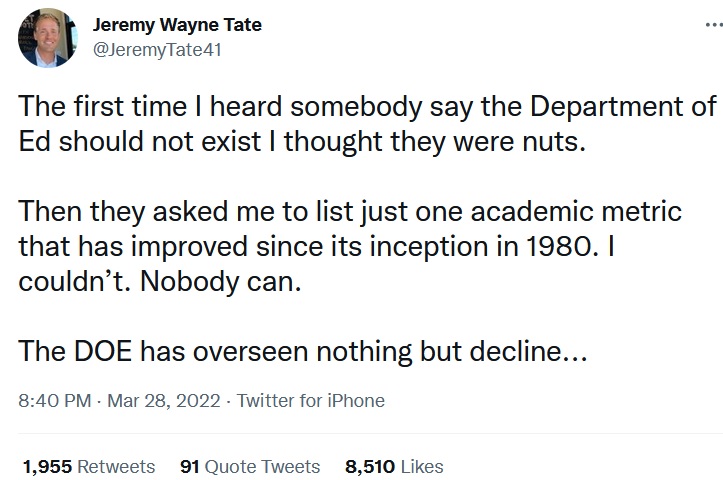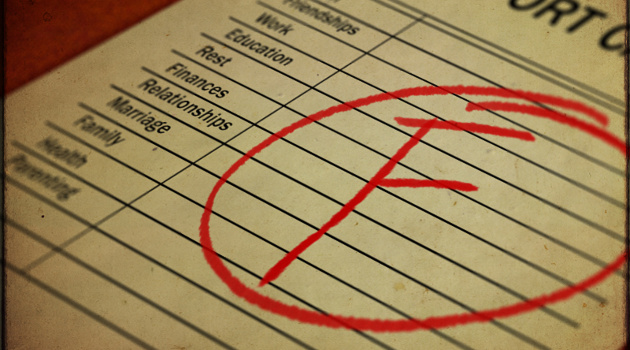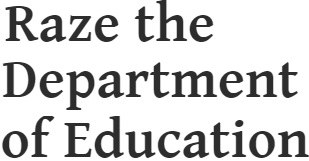I’ve already shared a “Tweet of the Year” for 2022, as well the “Most Enjoyable Tweet” of the year.
I’m going to call this the “Most Obvious Revelation Tweet” since it reaches a should-have-been-immediately-clear conclusion that the Department of Education is a net negative for the United States.

I’ve already provided my two cents on why the Department of Education should be eliminated.
So let’s look at what others have said.
In a column for National Review, Charles Cooke says it’s time for the bureaucracy to be retired.
In our constitutional order, education is the preserve of the states, and it ought to be the preserve of the states — not only because educational institutions work best when they are close to their benefactors and beneficiaries, but because education is power and because the centralization of power presents enticements that are beyond any human being’s ability to resist. …We have now seen the failure of nationalized education policy under presidents of both parties: George W. Bush’s “No Child Left Behind” was a signature of his campaign in 2000 and his pre-9/11 presidency and has been largely abandoned, as has Common Core, which started life as a “conservative” idea but was quickly sucked into the maw under President Obama. The problem, as so often, is the system itself.
And here’s some of what Neil McCluskey wrote back in 2020.
Department of Education…was basically a payoff to the National Education Association, the nation’s largest teachers union, for their 1976 support of Jimmy Carter’s presidential candidacy. …What we have gotten… One thing we do know is that total, inflation‐adjusted federal education spending, including K‑12 programs and college student aid, has risen greatly since 1980, from $115 billion to $296 billion. Meanwhile, national test scores for 17‐year‐olds have been basically flat… Federal education meddling, especially since the advent of the Department of Education, has been of questionable value at best, and a high‐dollar, bureaucratic failure at worst.
Needless to say, I agree with both of them. The current system is bad for America’s kids.
If you’re wondering why I have that view, just click here, here, here, here, and here.
By the way, it’s not just that the Department of Education has been a failure for K-12 kids. It’s also been bad news for college students.
Here are some excerpts from a 2015 column that Richard Vedder wrote for the Foundation for Economic Education.
He observes that higher education was a success story before the Department of Education was created.
The 30 years between 1950 and 1980 were the Golden Age of American higher education. The proportion of adult Americans with college degrees nearly tripled, going from 6 to 17 percent. Enrollments quintupled, going from 2.3 to 12.1 million. …This was the era in which higher education went from serving the elite and mostly well-to-do to serving many individuals from modest economic circumstance. …During this period, however, the federal role was quite modest. …College costs remained remarkably stable. Tuition fees typically rose only about one percent a year, adjusting for inflation. At the same time, high economic growth (real GDP was rising nearly four percent annually) led to incomes rising even faster, so in most years the tuition to income ratio fell. In other words, college was becoming a smaller financial burden for families.
But things took a wrong turn after a new federal bureaucracy was created. Here are some of the reasons Prof. Vedder has identified.
First, of course, education costs have soared. Tuition fees rose more than three percent a year in inflation-adjusted terms, far faster than people’s incomes. …rising federal student financial aid programs are the primary factor in this phenomenon. …Second, if anything, college has become more elitist and less accessible to low income students. The proportion of recent graduates who are from the bottom quartile of the income distribution has declined since 1970 or 1980. …Third, there has been a shocking decline in academic standards. Grade inflation is rampant. …Fourth, accreditation of colleges, overseen by the Department of Education, is expensive and ineffective. …Fifth, the federal aid programs and “college for all” propaganda promoted by the Department have led to a large proportion (probably over 40 percent) of recent graduates being underemployed… Sixth, the Department is guilty of regulatory excesses and bureaucratic blunders. …the form required of applicants for federal student aid (FAFSA) is byzantine in its complexity.
For what it’s worth, I think Rich’s first item deserves some sort of special emphasis. Maybe a couple of exclamation points to drive home the point that higher education is absurdly over-priced today precisely because of government intervention to supposedly make it more affordable.
Now politicians are reacting to this mess by urging even more subsidies. Which will simply make the problem worse. Lather, rinse, repeat.
P.S. Here’s a bit of humor to compensate for the depressing news in today’s column.

My other examples of education-themed humor can be found here, here, here, and here.
P.P.S. Biden wants to reward failure with a 21 percent increase in the Department of Education’s budget.
———
Image credit: amboo who? | CC BY-SA 2.0.





